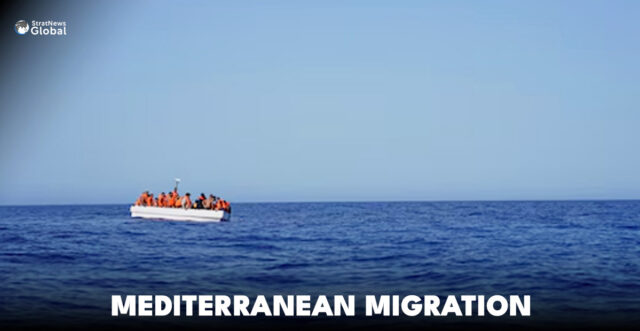The migration route from Libya across the Mediterranean, used by thousands heading to Europe, was a key focus of Friday’s Istanbul meeting between the leaders of Turkiye, Italy, and Libya, according to Turkiye’s presidency.
President Tayyip Erdogan met Italian Prime Minister Giorgia Meloni and Libyan Prime Minister Abdulhamid al-Dbeibah to discuss migration and other potential cooperation areas.
“Erdogan pointed to the importance of the cooperation between the three countries against the tests that the Mediterranean basin is facing, including irregular migration flows,” the presidency said in a statement.
He added that “long-term and sustainable solutions” were needed to stop such migration flows, and that multilateral coordination was needed to achieve this, it said.
Libya’s Migrant Crossroads
Major energy exporter Libya, long split between rival eastern and western factions, is one of the main jumping-off points for migrants crossing the Mediterranean from North Africa.
Rival regional powers – Russia, Turkiye, Egypt and the United Arab Emirates – have also been drawn into its political divisions.
NATO member Turkiye has militarily and politically supported Libya’s Tripoli-based internationally recognised government.
In 2020, it sent military personnel there to train and support its government and later agreed to a maritime demarcation accord, which has been disputed by Egypt and Greece.
In 2022, Ankara and Tripoli also signed a preliminary accord on energy exploration, which Egypt and Greece also oppose.
Turkiye-Italy Strategic Ties
NATO allies Turkiye and Italy, meanwhile, have strong ties and have pledged to boost cooperation in the defence industry, while also increasing their reciprocal trade.
Italy’s Leonardo and Turkiye’s Baykar announced in March that they were setting up a joint venture to produce unmanned aerial vehicles, while Ankara has been inching closer to securing a procurement of 40 Eurofighter Typhoon fighter jets from a consortium that includes Italy.
Erdogan’s office also said the three leaders agreed to meet to evaluate any decisions taken by their cooperation committees later.
(With inputs from Reuters)





